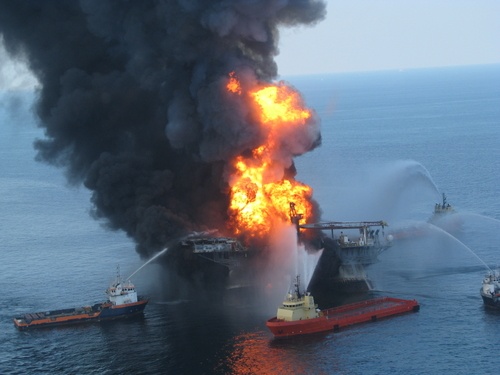VOICES: The injustice of BP's criminal plea deal

By Cherri Foytlin, Bridge the Gulf
(In New Orleans today, a federal judge approved a deal allowing BP to plead guilty to manslaughter and other criminal charges related to the 2010 Gulf of Mexico oil spill disaster in exchange for a $4 billion fine, probation and independent monitoring. U.S. District Judge Sarah Vance announced her decision over the emotional objections of victims of the disaster and relatives of some of the 11 men who were killed on the Deepwater Horizon drilling rig. Among the people urging rejection of the deal was Cherri Foytlin, a Louisiana journalist and the wife of an oil worker who was sickened by exposure to BP's spilled oil and who has since become an outspoken environmental justice activist. Foytlin delivered the following letter to Judge Vance after the settlement was announced. -- Ed.)
First, I wish to thank you for the opportunity to speak to you today.
My name is Cherri Foytlin. I live in Rayne, Louisiana, am the mother to six beautiful children and the wife of an oil worker. As a journalist I have been witness to this disaster since May of 2010, suffered economic loss due to the moratorium, and was sickened in fall of that same year by chemicals used during the spill response. I am one of millions who have been adversely affected by this disaster, in a variety of ways, and as such, I urge you NOT to accept the criminal plea deal as proposed and endorsed by the Department of Justice and BP.
To me, this settlement is nothing more than a broad brush attempt by BP's highest officials to evade full responsibility for a still evolving catastrophe. My fear is that without appropriate public scrutiny, the largest environmental disaster in American history will fall to the wayside like so many of this company's past transgressions.
I implore you to remember that this company is a serial corporate polluter and a serial corporate killer -- not just in the United States, but all over the world -- in Texas City, in Alaska, in the Caspian Sea, in the Gulf and now in Algeria, yet they keep managing to get away with little more than a slap on the wrist ... and meanwhile people keep dying.
To allow BP to focus only on the day the Deepwater Horizon blew, and not to consider the general lack of safety culture described by the Chemical Safety Board in both the Deepwater Horizon and the Texas City refinery disasters, is to leave the Gulf of Mexico's ecosystem, industries, cultures and people at the mercy of a repeat offender.
This time they should be held to the fire.
For this reason, I fully support a full trial proceeding. The world must know the truth in order to prepare for, and prevent, future disasters of this kind.
The public deserves to know the history of short cuts by this company that led up to this event. They should know of troubles that started when the drill bit hit the earth -- they should know of the design flaws, about the firing of Curtis Jackson and Kevin Lacy for speaking out over their concerns for safety, about oil workers who tried to notify London of the looming catastrophe, about ignored phone calls, emails, and morning reports.*
They should also know about Tony Hayward's "Every dollar counts" in 2008 that mandated a 7% reduction in cost of all drilling operations in the Gulf of Mexico, and a 20 percent reduction of experienced senior management ... and on ... and on ...
Only then will there be true justice for a corporation whose general pattern is to focus on production and profit over the health, environment and safety of the communities and workers on which it depends.
Again, I must ask that the consideration of this settlement be not one dime less than the full extent of possible fines levied against this company, and yet I understand that both the DOJ and BP are in agreement of the plea as written and that it is highly unlikely this will occur.
Therefore I must add that even if the proposed deal stands, there must be the establishment of a Regional Citizens Advisory Committee both to oversee the coming regional restoration funds, and to provide safety monitoring, regulatory process recommendations, spill prevention and response training, and oversight to the industry itself.
I ask this as a citizen of a state where a large portion of RESTORE Act funds are slated go to an organization like the Water Institute, the touted "research arm of the state's coastal restoration program," whose president, Charles Groat, was found to have recently provided tainted research which falsely favored the oil and gas industry. In Louisiana, where a 9-acre industry induced sinkhole can go unnoticed and unaddressed by a governor, where releases of known toxins like sulfur dioxide and benzene in the air, and drilling mud and hydrocarbons in the water are common occurrences, we desperately need citizen oversight.
In closing, I would like to say that the people, wildlife, ecosystems, industries and workers of the Gulf of Mexico are not trade-offs. We are depending on you to assign appropriate value to our lives, swift and fair justice on behalf of lives lost, and the foresight to allow us to be empowered with the protection of ourselves in the future.
Thank you for your consideration.
* Public Hearings of the Marine Board Inquiry posted on C-span public domain
